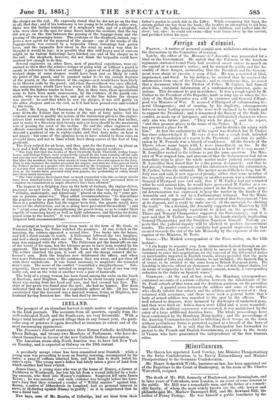ffartigu Ruh tulurunl.
FRANCE.—A matter of personal scandal now withdraws attention from the discussions in the Committee of revision.
Lately, the editor of the Message,- de r Assenablie was prosecuted for a libel on the Government. He stated that the Colonels of the fourteen regiments stationed round Paris had received secret orders to march on the capital at a moment's notice ; and he warned the public and the As- sembly of their danger, insinuating that the President and the Govern- ment were about to execute a coup d'etat. Ile was convicted of libel, imprisoned, and fined. In his defence, he averred that he received the information from one of the Colonels ; and to corroborate this, he stated that a document which the Prefect of Police, M. earlier, had himself given him, contained information of a confirmatory character, quite as serious. This document he put in evidence. It was a rough report by M. Carlier to the President of the Republic, made as long ago as when the So- ciety of the Sixth December was still in existence and General d'Ilaut- pout was Minister of War. It accused d'Hautpoul of calumniating Ge- neral Changarnier ; and of causing, by his duplicity, estrangements between many leading persons who were well inclined to be friends and to support the President ; and it denounced the Society of the Sixth De- cember, as made up of intriguers and men of blemished characters whose only aim was future place. "They wish for places," said the report,
"and they promise places in the name of the Prince. M. L
has procured a place for M. , and he divides the salary with him." At first the authenticity of the report was doubted, but M. earlier has since acknowledged it. He says it was but a rough draft, intended only for the foundation of a report to the President ; and that its publi- cation by M. Forcade was a breach of confidence. All the friends of the Elysee whose name began with L. were immediately on fire. In the Assembly, on Monday, M. Larabit demanded to know if he was meant ? N. Lemullier rushed to the tribune to put the same question. The Min- ister of War stopped him, and announced that the Government had taken immediate steps to place the whole matter under judicial investigation. N. Lemullier then stated that he is the person designated; and that he had already formally communicated his intention to bring the calumniator, N. Carlier, before the tribunals. The matter seemed likely to drop, but M. Joly rose and said, it now appeared plainly, either that some member of the Assembly was decidedly corrupt, or another person was a calumniator. General d'Hautpoul rose and said, that if M. Cartier had not retracted what he said against him, he would have prosecuted M. earlier as a ca- lumniator. Some leading members joined in the discussion, and a gene- ral determination was expressed to keep the matter in the hands of the Assembly and sift it out by a Parliamentary tribunal. But the Minis- ters strenuously opposed this course, and avowed that Government "has at its disposal, and is ready to make use of all the materials for eliciting the truth." On a division, the Assembly supported the Ministers by 335 to 306 only,—a majority equivalent to defeat on the question. M. Thiers and General Changarnier supported the Government; and it is now said that M. Carlier has evidence in his hands similarly implicating General Changarnier and the President Napoleon himself. Nobody ex- pects that the judicial inquiry will be allowed to produce inconvenient results. The matter excites a similarly bad general impression to that created towards the end of the late Monarchy by the exposure of the cor- ruption of the Minister, IL Teste.
Srmar.—The Madrid correspondent of the Times writes, on the 13th instant-
" I am happy to acquaint you, from information derived through an un- doubted source, that Lord Howden is likely to succeed in inducing this Go- vernment to enter into negotiations for the removal of the differential duties on merchandise imported in English vessels, always provided that the ports
of the island of Cuba and other colonies be not included : the Spanish is of course to be entitled to the same boon in British European ports. Ills Lordship is likewise offered an abatement on the cod-fish import-duties, but on terms of reciprocity to which we cannot consent, namely, a corresponding reduction in the duties on Spanish wines."
GERMANY.—At the end of last week, the Hamburg correspondence contained accounts of a serious collision between the inhabitants of the St. Pauli suburb of that town and the Austrian garrison, on the preceding Sunday. A quarrel arose between the soldiers and some of the sailors who chiefly inhabit that suburb, and the soldiers got the worst of it : they returned with assistance, and there arose such a general battle that a body of armed soldiers was marched to the spot by the officers. The mob refused to disperse, were menaced by discharges of unshotted guns, and then were fired on : half-a-dozen were killed and a score wounded ; and when the military supremacy was asserted, it was maintained by the entry of a large additional Austrian force. The whole proceedings have been condemned by the Hamburg Municipality; and the proceedings of the Austrian Commander-in-chief in billetting fresh troops on the town without preliminary forms is protested against as a breach of the laws of the Confederation. It is said that the Municipality has forwarded its protest to the French and English Governments, as parties to the treaty of Vienna who have guaranteed the independence of the free German cities.


























 Previous page
Previous page